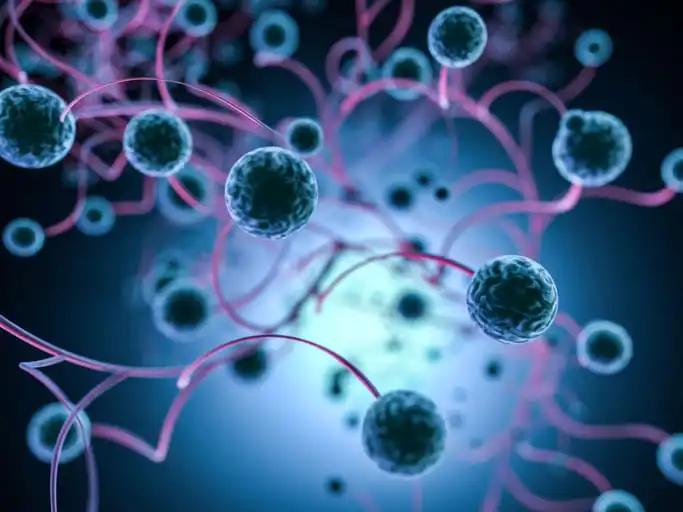KEY TAKEAWAYS
- The phase-3 KarMMa-3 study evaluated idecabtagene vicleucel (ide-cel) as a treatment for RRMM patients.
- The primary objective was progression-free survival, and the secondary objectives were overall response rate and overall survival.
- Ide-cel substantially improved PFS and ORR, with durable responses compared to the standard regimens.
Patients with relapsed and refractory multiple myeloma (RRMM) who are triple-class exposed (TCE) to immunomodulatory agents, proteasome inhibitors (PIs), and anti-CD38 monoclonal antibodies experience poor survival outcomes. As these patients (pts) become exposed to TCE earlier in their therapy, their available treatment choices become limited. Notably, idecabtagene vicleucel (ide-cel) has shown significant and lasting positive responses in extensively treated TCE RRMM cases.
The phase-3 KarMMa-3 study included pts with RRMM who had undergone 2–4 prior treatment regimens utilizing an immunomodulatory agent, a PI, and daratumumab. The pts had shown resistance to their most recent treatment plan. They were randomized in a 2:1 to receive either ide-cel or follow a standard regimen (determined by the investigator and included options like daratumumab + pomalidomide and dexamethasone, daratumumab with bortezomib and dexamethasone, ixazomib paired with lenalidomide and dexamethasone, carfilzomib alongside dexamethasone, or elotuzumab along with pomalidomide and dexamethasone). Ide-cel was administered through an infusion at a dose of 150–450×106 chimeric antigen receptor-positive (CAR+) T cells (maximum allowance of ≤540×106 cells). The primary goal was progression-free survival (PFS), while secondary endpoints included assessing the overall response rate and overall survival. Other outcomes were the duration of response (DOR), health-related quality of life (QoL), pharmacokinetics, and safety. The assessment of effectiveness was conducted as per ITT.
Out of a total of 386 pts (ide-cel n=254; standard regimens n=132), 225 administered ide-cel (median dose of 445×106 CAR+ T cells (ranging from 175 to 529×106), while 126 received standard regimens. The baseline characteristics included a median age of 63 years, median time since diagnosis of 4.1 years, median prior therapies (n=3), refractoriness to triple-class treatments in 66% of cases, and daratumumab 95%. High-risk cytogenetics, in 44% of cases, were well balanced. The median duration follow-up from randomization to the data cutoff was 18.6 months. Compared to standard regimens, ide-cel demonstrated a significant enhancement in PFS (median of 13.3 months compared to 4.4 months; HR 0.49; P < 0.0001). Ide-cel displayed an improvement in ORR compared to standard regimens (71% vs. 42%; P < 0.0001), complete responses (39% vs. 5%), and longer-lasting responses (median duration of response 14.8 vs. 9.7 mo).
The favorable effects of ide-cel on PFS and ORR remained consistent across various subgroups of pts. Following ide-cel infusion, CAR+ T cells experienced rapid multi-log expansion, achieving maximum increase within a median of 11 days. In the group that underwent treatment, grade 3/4 adverse events (AEs) were observed in 93% of pts treated with ide-cel and 75% of pts on the standard regimen. Fatal grade 5 AEs occurred in 14% and 6% of the respective groups, while treatment-related AEs were noted in 3% and 1%. Of the pts who received ide-cel, 88% experienced any-grade cytokine release syndrome, with 4% of cases being grade 3/4. Investigator-identified neurotoxicity was observed in 15%, with 3% experiencing grade 3/4 events. Regarding patient-reported outcomes, ide-cel reported substantial improvements in symptoms, functioning, and QoL vs. standard regimens.
Ide-cel substantially improved PFS and ORR, with durable responses compared to standard regimens. The toxicity profile of ide-cel corresponded with previous investigations. These outcomes support the use of ide-cel for early-relapse TCE RRMM treatment.
Source: https://ebmt2023.abstractserver.com/program/#/details/presentations/1688
Clinical Trial: https://classic.clinicaltrials.gov/ct2/show/NCT03651128
Rodríguez-Otero, P., Ailawadhi, S., Arnulf, B., Patel, K., Cavo, M., Nooka, A.K., Manier, S., Callander, N., Costa, L.J., Vij, R., Bahlis, N.J., Moreau, P., Solomon, S.R., Delforge, M., Berdeja, J., Truppel-Hartmann, A., Yang, Z., Favre-Kontula, L., Wu, F., Piasecki, J., Cook, M., Giralt, S.



